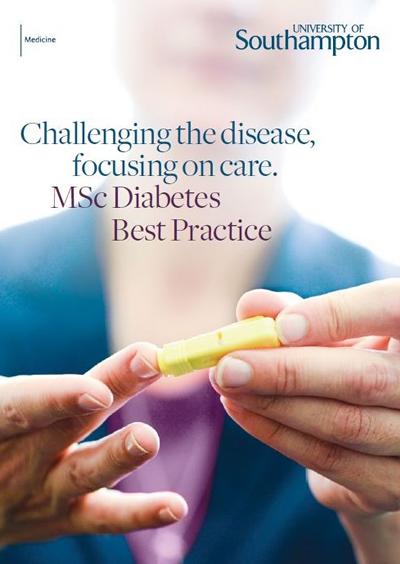Southampton’s new diabetes Masters programme will help healthcare professionals cope with demand burden

The University of Southampton has launched a brand new Masters programme in Diabetes Best Practice which is designed to equip workforces and individuals with the skills and knowledge to meet future diabetes healthcare demands in the UK and beyond.
This is particularly relevant following a recent Health and Social Care Information Centre report showing that the disease now accounts for 10 per cent of the NHS drugs bill in England.
The UK faces a significant increase in the number of people with type 1 and type 2 diabetes with over 700 new cases diagnosed each day, with numbers continuing to rise. The World Health Organization predicts that by 2030 the disease will be the seventh leading cause of death globally.
Healthcare research consistently concludes there is a recognised need for specialist diabetes care both in the UK and internationally. Figures show that in England alone there are 2.8 million people affected by diabetes.
This new MSc programme provides a unique combination of patient-centred teaching with leading expertise from internationally respected staff. It is suitable for healthcare professionals across the healthcare sectors and others, both clinical and non-clinical, who wish to develop skills in the diagnosis, treatment, psychology and management of diabetes.
Paul Perfrement who has type 1 diabetes, said: “This can only be good news for patients and the NHS. Having a diabetes specialist can make all the difference in how a patient is treated for the disease, and how they cope in their own environment.”
Diabetes UK said: “Ensuring professionals have the skills and knowledge they need to deliver best care to people with diabetes is paramount.”
Our flexible programme enables study to be undertaken alongside other commitments. Broad training will be provided in the skills required to understand and manage people with diabetes, helping them achieve optimal self-management and psychological well-being, helping make best use of NHS budgets.
Particular emphasis will be placed on supporting adults and young people more effectively, developing and improving healthcare provision through the ability to pass on expertise, and developing scientific understanding, clinical knowledge, practical skills and critical thinking qualities.
Stand-alone modules, two Postgraduate Certificates (Diabetes Best Practice and Principles of Diabetes) and a Postgraduate Diploma Best Practice are also available.